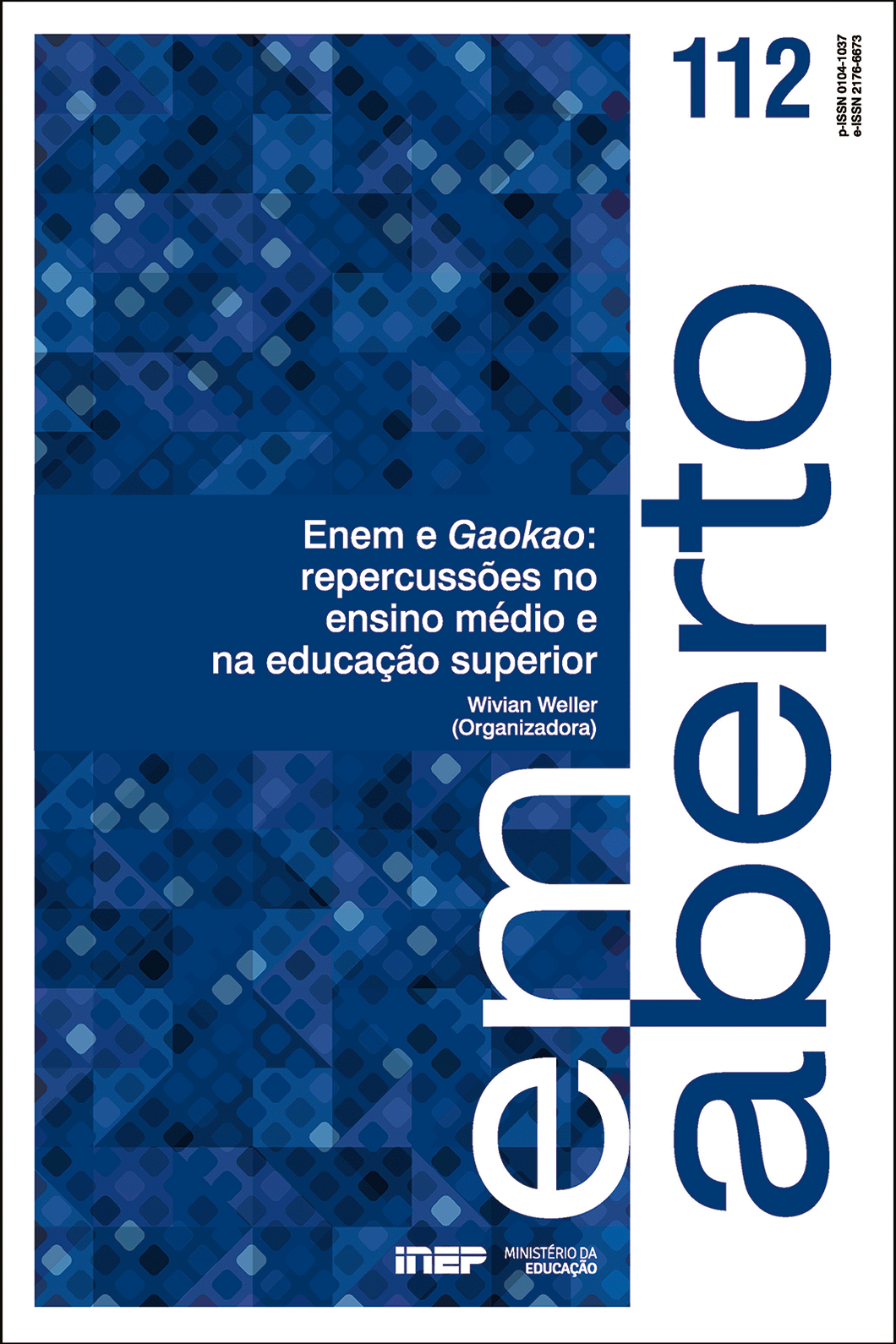Indifference to differences: the two stages of upper secondary education in China and the Gaokao preparation framework
Abstract
This article analyzes inequalities in the preparation conditions for the Gaokao exam, which reveals that these inequalities are inscribed in the institutional and historical context of massification of higher education in China. Data comes from an ethnographic research conducted in two high schools in Beijing enjoying different statuses: one is a key school and the other an ordinary school. In the year set for the Gaokao preparation, students take repetitive and constant exams: the main ones, once a month, and the minor ones, about four or five times a week. A qualitative approached allowed the research to focus on the period before the exam, as well as on the uneven effects it casts over the students’ trajectory. The disparity of resources set for this preparation involves two aspects: time and space for students and availability of teachers to supervise study efforts after the end of classes. Findings reveal that hierarchization of schools creates inequality of learning conditions, while it justifies and invisibilizes them.
Downloads
References
BLANCHARD, Marianne; CAYOUETTE-REMBLIÈRE, Joanie. Sociologie de l’école. Paris: La Découverte, 2016. 128 p.
BOURDIEU, P.; PASSERON, J. C. La reproduction: éléments pour une théorie du système d’enseignement. Paris: Minuit, 1970.
CHINA. ZHONGYANG JIAOYU KEXUE YANJIUSUO [INSTITUTO CENTRAL DE CIÊNCIAS DA EDUCAÇÃO]. Zhonghua renmin gongheguo jiaoyu dashiji 1949- 1982 [Cronologia da educação na República Popular da China 1949-1982]. Beijing: Jiaoyu kexue chubanshe [Imprensa das Ciências da Educação], 1984.
FU, Lujian. Dui woguo zhongdianzhongxue fazhanlishi de kaocha [Uma revisão da história do desenvolvimento das principais escolas secundárias na China]. Jiaoyu Pinglun [Revista da Educação], [S.l.], n. 4, p. 28-31, 1994.
GOLDTHORPE, J. H. Rational action theory for sociology. The British Journal of Sociology, London, v. 49, n. 2, p. 167192, June 1998.
HAO, Dahai. Zhongguo chengshi jiaoyu fenceng yanjiu (1949-2003) [A estratificação da educação nas cidades chinesas (1949-2003)]. Shehuixue yanjiu [Estudos sociológicos], [S.l.], n. 6, p. 94-107, 2007.
LI, Chunling. Wenhua shuiping ruhe yingxiang renmen de jingji shouru- duimuqian jiaoyu de jingjishouyilv de kaocha [Como a educação afeta a renda: um exame da relação econômica da educação]. Shehuixue yanjiu [Estudos Sociológicos], [S.l.], n. 3, p. 64-76, 2003.
LI, Chunling. Gaodeng jiaoyu kuozhang yu jiaoyu jihui bupingdeng – Gaoxiao kuozhao de pingdenghua xiaoying kaocha [Expansão do ensino superior e desigualdade de oportunidades educacionais: um exame do efeito equalizador da expansão do recrutamento universitário]. Shehuixue yanjiu [Estudos Sociológicos], n. 3, p. 82-133. 2010.
LI, Siyu. La méritocratie “à la chinoise”: le Gaokao, concours d’entrée dans l’enseignement supérieur. L’Année Sociologique, v. 70, n. 2, p. 469-494, 2020.
LIU, Jingming. Gaodengjiaoyu kuozhan yu ruxuejihui chayi:1978-2003 [A expansão do ensino superior e a diferença de oportunidades na entrada na universidade]. Shehui [Sociedade], v. 26, n. 3, p. 158-79, 2003.
LIU, Jingming. Jiaoyu xuanze fangshi ji qi houguo [O modo de seleção na educação e suas consequências]. Zhongguo renmin daxue xuebao – Journal de Recherche de l’Université de Renmin de Chine, [S.l.], n. 1, p. 64-71, 2004.
LUCAS, S. R. Effectively maintained inequality: education transitions, track mobility, and social background effects. American Journal of Sociology, Chicago, v. 106, n. 6, p. 16421690, May 2001.
MARINELLI, Maurizio. Jiang Zemin’s discourse on intellectuals: the political use of formalised language and the conundrum of stability. Journal of Current Chinese Affairs, v. 42, n. 2, p. 111-140, June 2013. Disponível em: https://doi.org/10.1177/186810261304200205. Acesso em: 20 dez. 2021.
PEPPER, S. Radicalism and education reform in twentieth-century China: the search for an ideal development model. Cambridge: Cambridge University Press, 2000.
RAFTERY, A. E.; HOUT, M. Maximally maintained inequality: expansion, reform, and opportunity in Irish education, 1921-75. Sociology of Education, [S.l.], v. 66, n. 1, p. 4162, Jan. 1993.
TAN, Xiaoling; WANG, Aiyun. Xinzhongguo chenglihou zhongdianxuexiao zhengce de yanbian [A evolução das políticas das escolas-piloto após a fundação da nova China]. Dangshi yanjiu yu jiaoxue [Recherche et Enseignement de l’Histoire du Parti], [S.l.], v. 254, n. 6, 2006.
TURNER, R. H. Sponsored and contest mobility and the school system. American Sociological Review, [S.l.], v. 25, n. 6, p. 855867, 1960.
WU, Yuxiao. Jiaoyu fenliuzhi yu zhongguo de jiaoyufenceng (1978-2008) [O sistema de diversificação e estratificação da educação (1978-2008)]. Shehuixue yanjiu [Estudos Sociológicos], [S.l.], n. 4, p. 179202, 2013.
YANG, Xuewei. Gaokao wenxian [Arquivos Gaokao]. Beijing: Gaodeng Jiaoyu Chubanshe, 2003.
YUAN, Z. Lun woguojiaoyu zhence dui woguo zhongdian zhognxue pingdeng yu xiaoyi de gean yanjiu [Um estudo de caso sobre a mudança na política educacional e o efeito sobre a igualdade e vantagem das escolas-piloto]. Guangzhou: Guangzhou Jiaoyu Chubanshe, 1999.
Copyright (c) 2021 Em Aberto

This work is licensed under a Creative Commons Attribution-NonCommercial 4.0 International License.
These are the terms of this Copyright Notice:
- I declare that I permanently forfeit in favor of the National Institute of Educational Studies and Research (INEP) all rights related to:
-
- editing, publication, reproduction, and distribution of the work;
- publication through digital and electronic media;
- translation of the work to any language;
- updating, re-printing, adaptation, and compression of the work;
- uploading of work in the publishing platform of INEP;
- divulging complete or parts of work through the World Wide Web (internet), whether in Brazil or foreign countries;
- authorization of third parties to execute any of the acts mentioned before.
- I explicitly declare that I am solely responsible for the opinions expressed in the work, and its publication does not violate the rights of third parties.
- I declare that the nature of said work is one of pro bono publico and, as such, I forfeit the right to any compensation regarding ownership rights granted.
- I authorize spelling and grammatical review of the manuscript, provided that the content and opinions therein remain unchanged.












